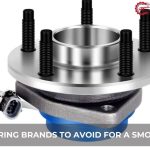When it comes to choosing the right tires for your vehicle, you want to make sure you’re getting the best quality for your money. BFGoodrich and Michelin are two of the most well-known tire brands in the industry, offering a wide range of products to suit every driving need. Whether you’re looking for performance tires for your sports car or all-terrain tires for your truck, both brands have something to offer.
It’s important to understand the strengths and target audience of each brand to make an informed tire selection. BFGoodrich is known for its durable and budget-friendly options, with excellent traction and handling. On the other hand, Michelin is a premium brand that offers superior quality, advanced technology, and exceptional wet performance. While Michelin tires come with a higher price point, they also offer longer mileage warranties and satisfaction guarantees.
By understanding the differences between these two brands, you can make the best decision for your driving needs and budget. Whether you prioritize durability and affordability or advanced technology and superior performance, there’s a tire out there for you. Let’s take a closer look at the BFGoodrich vs Michelin debate to help you make an informed decision.
Brand Heritage and Philosophies
BFGoodrich: A Legacy of Off-Road Prowess
When it comes to off-road tires, BFGoodrich is a name that stands out. Founded in 1870, BFGoodrich has a long history of developing innovative tires for off-road vehicles and performance driving. Their focus on durability, traction, and handling in challenging conditions has made them a popular choice for SUVs, trucks, and Jeeps.
BFGoodrich tires are designed to handle tough terrain, from rocky mountains to muddy trails. They offer a range of tire options for different off-road conditions, including all-terrain, mud-terrain, and rock-crawling tires. Their tires are known for their toughness and ability to handle extreme conditions.
Michelin: Pioneering Performance and Innovation
Michelin is a global leader in tire technology, established in 1889. They are renowned for their focus on safety, longevity, and comfort. Michelin offers a wide range of tire options for various driving styles and weather conditions, making them a popular choice for passenger cars, SUVs, and luxury vehicles.
Michelin’s focus on innovation has led to the development of many groundbreaking technologies, such as the radial tire, which revolutionized the tire industry. They also prioritize sustainability and have made efforts to reduce their environmental impact through initiatives such as using recycled materials in their tires.
When it comes to Michelin vs BFGoodrich tires, it’s important to consider the driving conditions and vehicle type. BFGoodrich is known for its off-road prowess, while Michelin offers a wider range of tire options for various driving styles. Ultimately, the choice between the two brands will depend on your specific needs and preferences.
Performance Characteristics: A Head-to-Head
On-Road Performance
When it comes to on-road performance, Michelin tires generally outperform BFGoodrich tires in terms of comfort, quietness, and precise handling. Michelin tires are known for their superior ride quality, making them a great choice for long distance driving. However, certain BFGoodrich touring models offer good handling and responsiveness, although they may not match Michelin’s overall comfort and noise reduction.
Off-Road Performance
BFGoodrich offers a wider range of dedicated off-road tires with aggressive tread patterns for superior traction in mud, sand, and rocky terrain. If you’re looking for a tire that can handle any off-road challenge, BFGoodrich is a great choice. On the other hand, while some all-terrain options exist, Michelin’s focus lies more on on-road performance with some off-road capability.
Fuel Efficiency
Michelin often prioritizes fuel efficiency with technologies that minimize rolling resistance, potentially leading to better gas mileage. Certain Michelin models are designed specifically for fuel efficiency, making them a good choice for those looking to save money at the gas pump. While certain fuel-efficient BFGoodrich touring models can compete with Michelin, overall, aggressive off-road tread designs tend to have higher rolling resistance.
Considering Your Driving Needs
When choosing between BFGoodrich vs Michelin tires, it’s important to consider your driving needs. Here are some factors to consider:
Driving Terrain and Conditions
If you frequently encounter off-road conditions, mud, or gravel roads, BFGoodrich tires may be the better option for you. They are designed to handle rough terrain and provide excellent traction. On the other hand, if you mostly drive on paved roads and prioritize comfort, fuel efficiency, and all-weather capability, Michelin tires may be the better choice.
Vehicle Type and Performance Expectations
Your vehicle type and performance expectations should also be taken into account. BFGoodrich tires are well-suited for SUVs, trucks, and Jeeps that require off-road capability or a balance between on- and off-road performance. Michelin tires, on the other hand, cater to a wider range of vehicles, from passenger cars to SUVs, with a focus on various performance aspects depending on the chosen tire model.
Price Considerations
Price is also an important factor to consider when choosing between BFGoodrich vs Michelin tires. BFGoodrich tires are generally more affordable than Michelin, especially for off-road-oriented tires. Michelin, on the other hand, often commands a premium price point due to advanced technologies and focus on high performance.
Making the Right Choice: It’s All About Your Drive
When it comes to choosing between BFGoodrich and Michelin tires, it’s important to keep in mind that both brands offer high-quality tires that cater to different driving needs and priorities. To make the right choice, you should consider the following factors:
- Driving style: Are you an aggressive driver who likes to push your vehicle to its limits, or do you prefer a more relaxed and conservative driving style? BFGoodrich tires are known for their excellent traction and handling, making them a great choice for performance-oriented drivers. On the other hand, Michelin tires are designed for comfort and longevity, making them a great choice for drivers who prioritize a smooth and quiet ride.
- Vehicle: The type of vehicle you drive can also influence your tire choice. BFGoodrich tires are a popular choice for trucks and SUVs, thanks to their rugged construction and off-road capabilities. Michelin tires, on the other hand, are a great choice for luxury sedans and other high-end vehicles, thanks to their advanced technology and superior comfort.
- Typical conditions: Finally, you should consider the typical driving conditions you’ll be facing. If you live in an area with frequent rain or snow, you’ll want to choose tires with excellent wet and snow traction, such as Michelin’s CrossClimate 2. If you frequently drive on rough or unpaved roads, you’ll want tires with a tough and durable construction, such as BFGoodrich’s All-Terrain T/A KO2.
Ultimately, the choice between BFGoodrich and Michelin tires comes down to your individual driving needs and priorities. By considering the factors mentioned above, you can select the brand that best aligns with your driving style, vehicle, and typical conditions.
Beyond the Brands: Additional Factors to Consider
Specific Tire Model Comparisons
When deciding between BFGoodrich and Michelin tires, it’s important to compare specific models from each brand. Look at their performance ratings, treadwear warranties, and consumer reviews to make an informed decision. For example, the BFGoodrich Advantage Control offers a smooth ride with its advanced tread pattern and reinforced sidewalls, while the Michelin CrossClimate 2 provides reduced road noise and vibration-absorbing capabilities thanks to its innovative design and compound technology.
Consider your driving habits and needs when choosing between these two brands. BFGoodrich tires are known for their durability and budget-friendliness, with excellent traction and handling. They can be slightly noisier on certain road surfaces, however. Michelin, on the other hand, is a premium brand known for superior quality, advanced technology, and exceptional wet performance. Their higher price point is offset by longer mileage warranties and satisfaction guarantees.
Importance of Qualified Tire Dealers
It’s also important to seek out a qualified tire dealer who can offer professional advice on tire selection based on your vehicle and driving habits. They can help you navigate the differences between BFGoodrich and Michelin tires and find the best fit for your needs. A reputable dealer can also ensure that your tires are properly installed and balanced, which can extend their lifespan and improve your vehicle’s performance.
When choosing a tire dealer, look for one with a good reputation and experience working with both BFGoodrich and Michelin tires. They should be able to answer any questions you have and provide guidance on tire maintenance and care. Remember, investing in high-quality tires and working with a qualified dealer can help ensure your safety and satisfaction on the road.
Conclusion
In conclusion, BFGoodrich and Michelin are both excellent tire brands with their own strengths and weaknesses. BFGoodrich tires are known for their off-road capabilities and durability, making them a great choice for adventurous drivers who frequently venture off the beaten path. Michelin, on the other hand, is a premium brand that prioritizes on-road performance and innovation, making them a great choice for drivers who prioritize comfort and safety on paved roads.
When deciding between BFGoodrich and Michelin, it’s important to consider your individual needs and preferences. If you frequently drive off-road or in harsh conditions, BFGoodrich may be the better option for you. If you prioritize on-road performance and comfort, Michelin may be the better choice.
Ultimately, the decision between BFGoodrich and Michelin comes down to your personal priorities and driving habits. Consider your needs carefully and make an informed decision for your next set of tires.
Related Posts:
- BFGoodrich vs Michelin: Which Tire Brand is Better?
- Blackhawk Tires Review: Affordable and Reliable Tires for Your Vehicle
- Blackhawk vs Michelin Tires: Which One Is the Better Choice?
- Fullway Tires Review: Are They Worth the Investment?
- Lion Sport Tires Review: The Ultimate Guide to Choosing the Best Tires for Your Vehicle
- Primewell Tires Review: Are They Worth the Investment?
- Worst Tire Brands to Avoid: A Friendly Guide to Choosing the Right Tires












